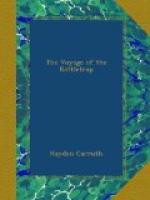“Right on the war-path all the time, flourishing a scalping-knife above his head, and whooping his teeth loose—that’s your notion of an Indian.”
“Well, I don’t know as that is exactly it,” returned Ollie, doubtfully. “But it seems to me these are hardly right. Their clothes seem to be just like white people’s.”
“I don’t know about that,” said Jack. “I saw one when I went around to the post-office wearing bright Indian moccasins, a pair of soldier’s trousers, a fashionable black coat, and a cowboy hat. I never saw a white man dressed just like that.”
“Well, I think they ought to wear some feathers, anyhow,” insisted Ollie. “An Indian without feathers is just like a—a turkey without ’em.”
The Indians were idling all over town, big, lazy, villanous-looking fellows, and very frequently they were smoking cigarettes, and often they were dressed much as Jack had described, though their clothes varied a good deal. There were two points which they all had in common, however—they were all dirty, and all carried bright, clean repeating-rifles, We wondered why they needed the rifles, since there was no game in the neighborhood.
The chief business of Rushville seemed to be shipping bones. We went over to the railroad to watch the process. There were great piles of them about the station, and men were loading them into freight-cars.
“What’s done with them?” we asked of a man.
“Shipped East, and ground up for fertilizer,” he answered.
“Where do they all come from?”
“Picked up about the country everywhere. Men make a business of gathering them and bringing them in at so much a load. Supply won’t last many months longer, but it’s good business now.”
They were chiefly buffalo bones, though there were also those of the deer, elk, and antelope. We saw some beautiful elk antlers, and many broad white skulls of the buffalo, some of them still with the thick black horns on them. As we were watching the loading of the bones Ollie suddenly exclaimed:
“Oh, see the pretty little deer!”
We looked around, and saw, in the front yard of a house, a young antelope, standing by the fence, and also watching the bone-men as they worked.
“It is a beautiful creature, isn’t it?” said Jack. “And how happy and contented it looks!”
“I guess it’s happy because it isn’t in the bone-pile,” said Ollie.
We went over to it, and found it so tame that it allowed Ollie to pet it as much as he pleased. The man who owned it told us that he had found it among the Sand Hills, with one foot caught in a little bridge on the railroad, where it had apparently tried to cross. He rescued it just before a train came along.
We left Rushville after a rather longer stop for noon than we usually made. Nothing worthy of mention occurred during the afternoon, and that night we camped on the edge of another small town, called Hay Springs.




